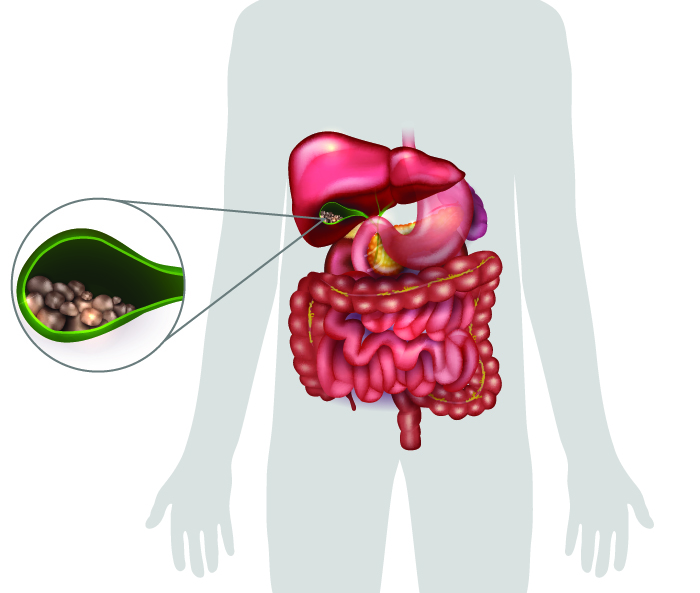Gall Bladder Stones Treatment in C Scheme, Jaipur
Gall bladder stones are caused due to the materials that deposit in the gall bladder. The gall stones can range in terms of the shape and hardness of the stones. People who have gall stones are generally not aware of them as no symptoms are being shown. The larger gall stones tend to remain quietly in the gall bladder causing no harm. In such cases, treatment is not required.
What Are Gall Bladder Stones?
The gall bladder is a pear-shaped organ which is located just beneath the liver. The gall bladder releases a digestive fluid called bile juice. Bile juice is released into the small intestine.
Gall bladder Stones are the hardened stones or deposits that develop in the gall bladder. Ironically, the small stones cause the most trouble than the large stones. The large stones tend to settle quietly.

What Are the Types of Gall Bladder Stones?
The gall bladders stones are classified into two types:
- Pigment stones: These are made up of bilirubin. These stones develop when the red blood cells are damaged in the liver. Excessive leakage of bilirubin into the bloodstream causes the eyes to turn yellow. Pigment stones are smaller and darker.
- Cholesterol stones: Constituting approximately 80%, these are the most common types of gall bladder stones. These are yellow-green in colour and are made up of fatty substances in the blood.
What Are the Symptoms of Gall Bladders Stones?
Generally, gall bladder stones do not cause any signs or symptoms. In such cases no treatment is necessary.
However, if the gall bladder stones cause symptoms, they may include the following:
- Extreme pain in the upper right abdomen under the ribs
- Intense pain on the right shoulder
- Intense pain in the centre of the abdomen just beneath the breastbone
- Nausea
- Vomiting
- Chest Pain
- Intense back pain
- Jaundice
What Are the Causes of Gall Bladder Stones?
The cause of the gall bladder has not been confirmed yet. However, the doctors seem to think it results because of the following:
- Bile containing excessive cholesterol: The cholesterol is excreted by the liver. Bile dissolves the cholesterol with the help of chemicals. However, when excessive cholesterol is released, bile cannot dissolve the cholesterol which in turn develops into the stones
- Bile contains excessive bilirubin: When Red blood cells are broken down, bilirubin is produced. Conditions such as infection, blood disorders, or cirrhosis can cause excessive release of bilirubin. This contributes to developing gall bladder stones.
- Gall bladder does not empty: In cases when the gallbladder does not empty itself, then the bile gets concentrated. This causes gall bladder stones.
When to See a Doctor at Apollo Spectra, Jaipur?
In most cases, the gall bladder does not cause any symptoms. However, it is advised to go see a doctor in Jaipur if there are signs or symptoms of the following inflammation or infection:
- Excessive abdomen pain lasting for several hours
- Jaundice
- Fever or chills
- Dark urine
- Light-coloured stool
Request an appointment at Apollo Spectra Hospitals, Jaipur
Call 1860 500 2244 to book an appointment.
How Are Gall Bladder Stones Diagnosed?
To confirm the presence of gall bladder stones, your doctor may order the following tests:
- Blood test: To check the sign of an infection
- Ultrasound
- CT scan
- Magnetic resonance cholangiopancreatography (MRCP)
- Endoscopic ultrasound: Combines endoscopy and ultrasound to look for gall bladder stones
- Cholescintigraphy (HIDA scan): This test confirms whether the gall bladder squeezes correctly.
How Are Gall Bladder Stones Treated?
When the symptoms are not caused, it is better to let them be quiet. They pass out of the body on their own. Few people get their gallbladder removed when there is severe pain or symptoms.
The surgery which is performed to remove the gall bladder is called a cholecystectomy. This can be carried out in the following two techniques:
- Laparoscopic cholecystectomy: Most people prefer this treatment as it is the most common. The doctor makes a small incision on the abdomen and passes an instrument called a laparoscope. This instrument removes the gall bladders stones.
- Open cholecystectomy: In this procedure, the gall bladder is removed completely by making a larger incision on the abdomen.
Conclusion
Gall bladder stones are considered harmless. You can lower the risk of gall bladder stones by maintaining a healthy diet and exercising.
If left untreated upon showing symptoms, gall bladder stones can cause problems such as:
- Blocked bile ducts
- Gall bladder cancer
- Gall bladder inflammation
A gall bladder does not need to be present to digest food. Without the gall bladder, the bile flows directly from the living passing through the hepatic duct to the small intestine.
The people who are at an increased risk to have gall bladder stones are:
- Have diabetes
- Over the age of 40
- Family history of gall bladder stones
- Eat a diet rich in fat or cholesterol
- Have blood disorders
Symptoms
Our Top Specialities
NOTICE BOARD
CONTACT US
CONTACT US
 Book Appointment
Book Appointment


.svg)
.svg)
.svg)
.svg)








